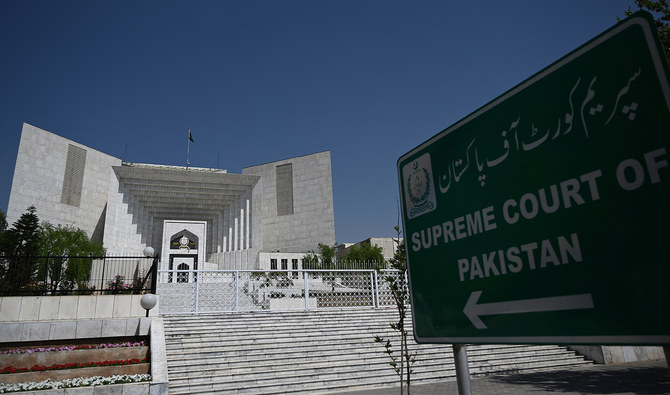F.P. Report
ISLAMABAD: Chief Justice of Pakistan (CJP) Qazi Faez Isa has said the Supreme Court will try to conclude the hearing on the lifetime disqualification case on January 4 (Thursday) — an important judgment that will determine whether lawmakers’ ineligibility to contest polls should be for a lifetime or five years under the amended Election Act 2017 in line with Article 62 (1)(F).
A seven-member larger bench led by Chief Justice of Pakistan (CJP) Justice Qazi Faez Isa heard the case of lifetime disqualification of lawmakers. The other members of the bench include Justice Syed Mansoor Ali Shah, Justice Yahya Afridi, Justice Aminuddin Khan, Justice Jamal Khan Mandokhel, Justice Muhammad Ali Mazhar and Justice Musarat Hilali.
The proceedings of the case were broadcast live on SC’s website and YouTube channel. On December 11, 2023, the chief justice while heading a three-member bench hearing a matter related to the disqualification of a former PML-N provincial lawmaker Sardar Meer Badshah Khan Qaisrani last month, took notice of the contradiction between its judgment and the legislation made through an amendment to the Election Act pertaining to the lifetime disqualification.
The chief justice had observed that the Supreme Court’s judgment on lifetime disqualification and the amendments made to the Election Act 2017 could not exist simultaneously. He further said either the legislation enacted by parliament to the Elections Act or the judgment delivered by the Supreme Court will prevail.
An apex court judgment in the year 2018 had held that any person disqualified under Article 62(1)(f) of the Constitution would be lifetime. Former prime minister Nawaz Sharif and then Pakistan Tehreek-e-Insaf (PTI) leader Jahangir Tareen were disqualified by the Supreme Court under Article 62(1)(f) of the Constitution in 2017.
The court had ruled that Nawaz had been dishonest to the parliament and the courts, and thus, he could not be deemed fit for his office. Later, an accountability court awarded him 10-year imprisonment in the Avenfield apartments and seven years in Al-Azizia references. However, the Islamabad High Court acquitted him in both cases after the former premier returned to the country.
In 2023, the coalition government of PDM made an amendment to the Elections Act 2017, decreasing the legislator’s disqualification to five years retrospectively. The matter is of immense importance as the general elections are being held on February 8, while the Election Commission of Pakistan has rejected the nomination papers of most of the main aspiring candidates of PTI including its founder Imran Khan. The electoral body, however, has accepted the nomination papers of most of the PML-N candidates including its supremo Nawaz which invited criticism from PTI leaders on the role of the commission.
At the outset of the hearing, Attorney General for Pakistan (AGP) Mansoor Usman Awan implored the bench to review its decision regarding the lifetime disqualification. At this, CJP Isa asked the AGP as to what in his opinion should prevail — the amended Election Act 2017 or the Supreme Court’s verdict on lifetime disqualification. The AGP said he would support the Election Act 2017 as it was enacted by the federal government. However, the AGP said the declaration of lifetime disqualification will remain effective unless the Supreme Court’s verdict remains in place. Justice Shah wondered whether it was possible to amend the Constitution via simple legislation or whether a constitutional amendment was required. Justice Mazhar said the limit of disqualification is not fixed in Article 62 (1)(F).
A person convicted of murder and treason could contest elections after a ban of some years, said Justice Shah asking if it is not inappropriate to disqualify someone for life over a “petty reason”. After Tareen’s lawyer Makhdom Ali Khan informed the court that Article 62 was added to the Constitution via presidential order in 1985, CJP Isa wondered whether a person who removed judges and violated the Constitution, be of good character. The CJP was referring to former military ruler Gen (retd) Ziaul Haq. CJP Isa said, in his opinion, the original Constitution should be relied upon if there is any contradiction between a Constitution and the amendments made to the Constitution later.
“I will rely on the legislation [enacted] by elected representatives and not on the [laws introduced] by the dictator,” he observed. What’s the difference between Articles 62 and 63? During the hearing of the case, CJP Isa asked Attorney General for Pakistan (AGP) Mansoor Usman Awan to explain the difference between Articles 62 and 63.
To which, the AGP said Article 62 deals with the eligibility of parliamentarians while 63 is related to disqualification. The CJP observed that the sub-clauses of Article 62 that deal with the public office holder’s character created difficulty. “How can the character of any person be determined? Is the attorney general a person of good character?” the CJP remarked saying that he asked the question related to AGP as an example. The CJP said supporters will say a person in question is of high character, while his opponents would describe his character as worst. CJP Isa observed according to Islamic standards, no one can be declared a person of high character.
‘Private armies are illegal’: SC
F.P. Report
ISLAMABAD: Chief Justice of Pakistan (CJP) Qazi Faez Isa Tuesday maintained that private militias are illegal and they cannot be against the state, as the Supreme Court conducted the hearing of a case pertaining to missing persons and enforced disappearances in the country.
The case was taken up by the apex court following petitions filed by multiple individuals including veteran politician and lawyer Aitzaz Ahsan. The timing of the case is also significant, as Islamabad is currently witnessing a sit-in by the families, including women and children of the Baloch missing persons, who arrived in the capital after starting a long march from Turbat.
A three-member bench headed by CJP Isa and comprising Justice Muhammad Ali Mazhar and Justice Musrat Hilali took up the case and conducted its hearing. The chief justice, following the adjournment of the hearing till tomorrow, said the court will now ensure the resolution of the missing persons issue, also summoning the Attorney General for Pakistan, Mansoor Usman Awan, to arrive before the bench in the next hearing.
“If we solve it together, the problem of missing persons will be resolved,” he said, adding that the resolution of this matter will strengthen Pakistan internally. CJP Isa also acknowledged the rights of citizens to conduct peaceful demonstrations who were protesting against the disappearances of their loved ones.
“There are also concrete cases of missing persons,” the CJP said. The chief justice also remarked that people in Pakistan often disappear after joining certain organisations, pointing at the anti-state entities present in the country. “The tradition of joining these organisations should end.”
He maintained that what is happening in Pakistan does not happen anywhere in the world. CJP Isa insisted that all parties must “accept responsibility” in this matter. The chief justice, however, pointed out that the petitions filed by Ahsan reflected a “political” inclination while raising the issue of enforced disappearances, as those named “disappeared” in the petitions were all politicians of a particular political party.







